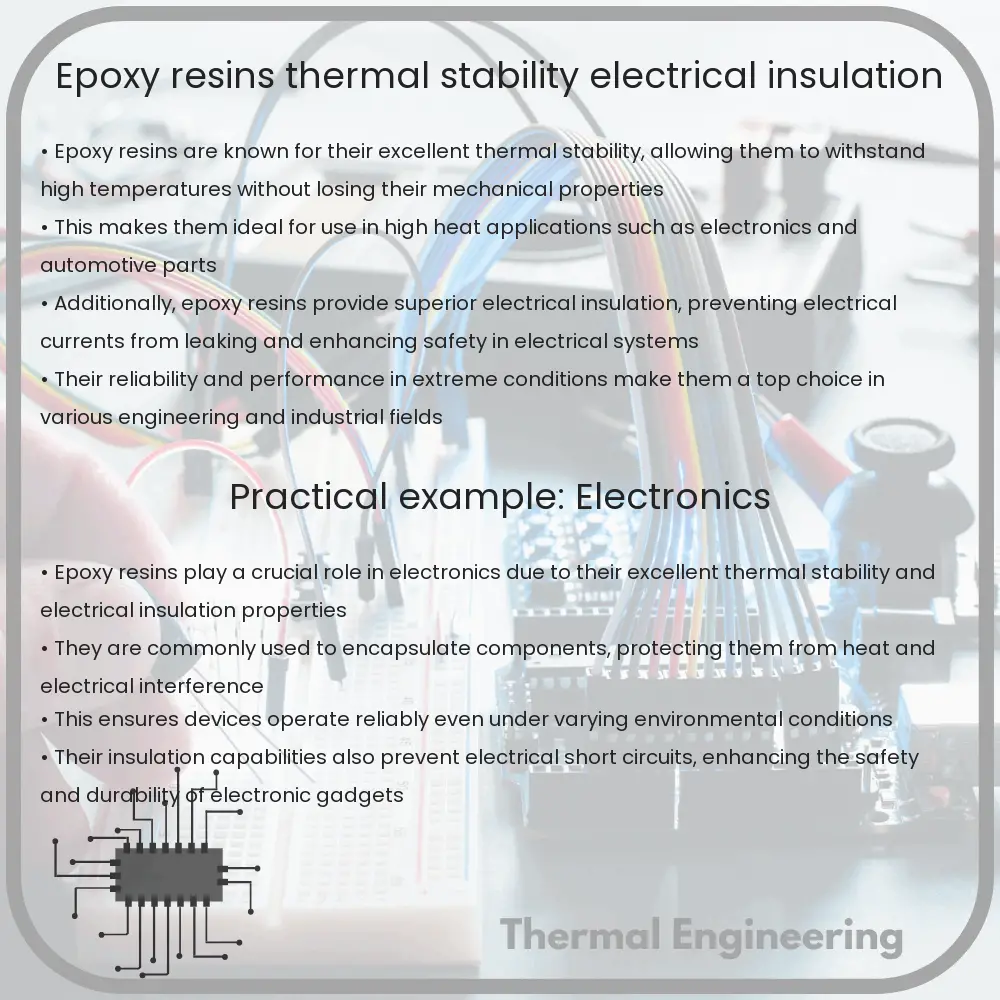Explore the key properties of epoxy resins, focusing on their thermal stability and electrical insulation for various industrial applications.

Understanding Epoxy Resins: Thermal Stability and Electrical Insulation Properties
Epoxy resins are a class of synthetic thermosetting polymers, often recognized for their outstanding mechanical properties, strong adhesion, and high thermal and chemical resistance. Central to their utility in various industrial applications are their thermal stability and electrical insulation characteristics. This article delves into these specific properties, explaining their significance and applications.
Thermal Stability of Epoxy Resins
Thermal stability is a measure of a material’s ability to retain its physical and chemical properties at elevated temperatures. Epoxy resins are known for high thermal stability, which makes them suitable for applications involving prolonged exposure to heat.
The thermal stability of epoxy resins is influenced by several factors, including their chemical structure and the curing agents used. Epoxy resins are made by reacting epoxide monomers with a curing agent, each of which can affect the thermal properties. For example, the use of aromatic amine curing agents often enhances the thermal stability compared to aliphatic amines.
The glass transition temperature (Tg) is a critical parameter in defining the thermal stability of epoxy resins. Tg is the temperature at which the polymer transitions from a hard, glassy material to a more rubbery, flexible form. Epoxy resins typically have a high Tg, which permits their use in environments subjected to high thermal loads. Above the Tg, the mechanical properties of the epoxy system decline significantly; hence, knowing the Tg is essential for ensuring that the material performs reliably under operating conditions.
Electrical Insulation Properties of Epoxy Resins
Epoxy resins are also valued for their excellent electrical insulation properties. These features make them ideal for a wide range of electrical and electronic applications, including insulators, encapsulants, and conformal coatings.
The dielectric constant and dielectric strength are two critical parameters that define the electrical insulating quality of a material. Epoxy resins typically have a low dielectric constant (ranging between 3 and 4) and high dielectric strength. These properties are vital in preventing electrical breakdowns, even at high voltages and under intense electrical fields.
Additionally, epoxy resins do not readily absorb moisture, which can significantly degrade electrical properties. This makes them especially useful in humid or wet environments, where other materials might fail to provide reliable insulation.
Applications
- Electronic Components: Epoxy resins are used as the primary insulating material in transformers, motors, and capacitors. They help prevent electrical failures, thereby enhancing the durability and safety of electronic components.
- Composite Materials: In aerospace and automotive sectors, epoxy resins are used to manufacture composite materials. Their thermal stability allows them to withstand the high temperatures often encountered in these environments.
- Protective Coatings: Epoxy coatings are applied to protect metal parts from corrosion and wear, especially those that are exposed to harsh chemical environments or extreme temperatures.
Conclusion
Epoxy resins are indispensable in various industrial applications due to their excellent thermal stability and superior electrical insulating properties. Understanding these properties helps in selecting the right type of epoxy resin for specific applications, ensuring safety, reliability, and performance. As materials technology continues to advance, the role of epoxy resins is set to become even more critical across a broad spectrum of engineering fields.